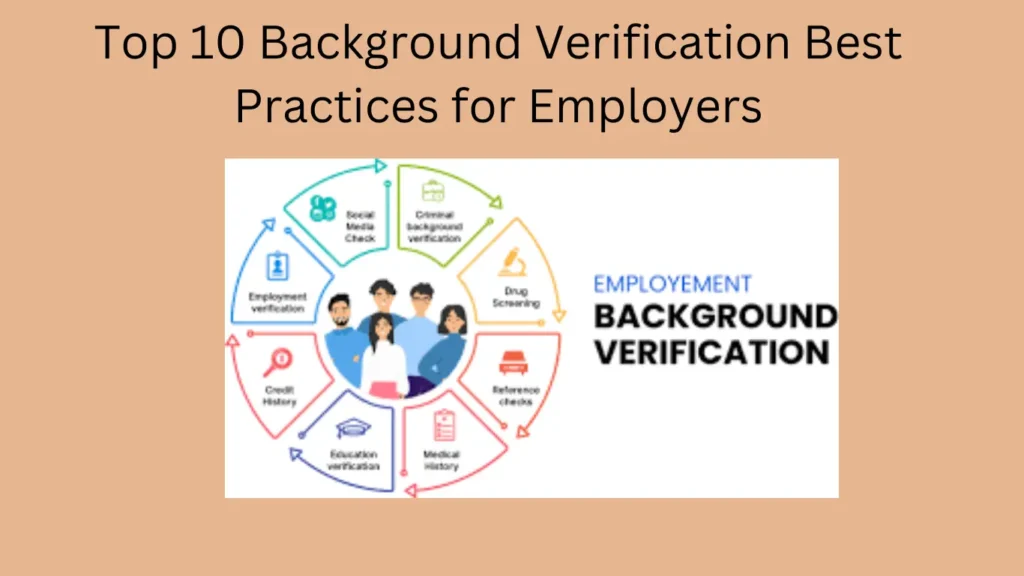Background verification is a critical component of the hiring process, helping employers make informed decisions and ensure a safe, compliant, and productive workplace. Implementing best practices for background verification not only mitigates risks but also enhances your company’s reputation. This guide outlines the top 10 best practices for employers to follow, ensuring a thorough, legal, and effective background screening process.
1. Develop a Comprehensive Background Verification Policy
Why It’s Important: A clear and detailed policy sets the foundation for consistent and fair background checks across your organization.
Best Practices
- Outline the types of checks to be conducted (e.g., criminal, employment, education).
- Specify the roles and responsibilities involved in the verification process.
- Ensure the policy aligns with industry standards and legal requirements.
2. Use Reputable Screening Providers
Why It’s Important: Partnering with trusted providers ensures the accuracy and reliability of background checks.
Best Practices
- Choose providers with strong credentials, certifications, and a proven track record.
- Check to see if they abide by all applicable rules and regulations.
- Look for suggestions and peruse evaluations from other companies.
3. Ensure Compliance with Legal Standards
Why It’s Important: Adhering to legal requirements prevents legal liabilities and protects your company’s reputation.
Best Practices
- Stay informed about federal, state, and local laws governing background checks.
- Make sure that the Fair Credit Reporting Act (FCRA) and other pertinent laws are followed.
- Review and update your background check procedure frequently to take into account changes in the law.
4. Obtain Candidate Consent and Provide Transparency
Why It’s Important: Transparency builds trust and ensures candidates are aware of the checks being conducted.
Best Practices
- Inform candidates about the background verification process and obtain their written consent.
- Clearly explain the types of checks to be conducted and how the information will be used.
- Provide candidates with a copy of their rights under applicable laws.
5. Maintain Confidentiality and Data Security
Why It’s Important: Protecting candidates’ personal information is crucial for maintaining trust and compliance with data protection laws.
Best Practices
- Put strong data security procedures in place to safeguard private data.
- Limit authorized personnel’s access to the results of background checks.
- Make sure that data protection laws like the CCPA and GDPR are followed.
6. Verify Information at Multiple Levels
Why It’s Important: Multiple levels of verification ensure the thoroughness and accuracy of the background check.
Best Practices
- Conduct criminal record checks at county, state, and federal levels.
- Verify employment and education history through direct contact with previous employers and institutions.
7. Tailor Background Checks to the Role
Why It’s Important: Different roles may require different levels of scrutiny and types of checks.
Best Practices
- Customize the background check process based on the role’s responsibilities and risks.
- Check credit histories for jobs requiring money matters, for instance, and driving records for jobs involving the operation of vehicles.
8. Communicate Results and Decisions Transparently
Why It’s Important: Clear communication helps manage candidate expectations and maintain a positive candidate experience.
Best Practices
- Inform candidates promptly about the results of their background checks.
- Provide an opportunity for candidates to dispute any inaccuracies.
- Clearly explain the reasons for any adverse employment decisions based on background check results.
9. Regularly Review and Update the Process
Why It’s Important: Regular reviews ensure the background verification process remains effective and compliant with current laws and industry standards.
Best Practices
- Set up recurring evaluations for your background check policies and processes.
- Revise the procedure to take into account modifications to laws, rules, and industry best practices.
- To determine what has to be improved, get recruiting managers’ and candidates’ input.
10. Provide Training and Support to HR Teams
Why It’s Important: Well-trained HR teams can effectively manage the background verification process and ensure compliance.
Best Practices
- Offer regular training on background verification policies, procedures, and legal requirements.
- Provide resources and support to help HR teams stay updated with best practices and legal changes.
- Foster a culture of continuous improvement and compliance within your HR department.
Conclusion
Implementing these best practices for background verification helps employers build a safe, compliant, and productive workforce. By developing a comprehensive policy, using reputable screening providers, ensuring legal compliance, maintaining confidentiality, and tailoring checks to specific roles, you can make informed hiring decisions that protect and enhance your company’s reputation. Adopting a people-first approach ensures transparency, fairness, and trust throughout the hiring process, contributing to long-term business success.
For further Inquires Contact Us
FAQs
Why is a comprehensive background verification policy important?
A clear policy ensures consistent and fair background checks across your organization, aligning with industry standards and legal requirements.
How do I choose a reputable background screening provider?
Choose service providers who have excellent ratings, certificates, and credentials. Check their history and compliance with pertinent legislation.
Which legal requirements have to be met in order to conduct background checks?
It is imperative to adhere to the Fair Credit Reporting Act (FCRA) and any other pertinent rules. Keep abreast of local, state, and federal laws.
Why is candidate consent necessary for background checks?
Obtaining candidate consent and providing transparency about the checks builds trust and ensures compliance with legal requirements.
How can I maintain confidentiality in background verification?
Implement robust data security measures, limit access to results to authorized personnel, and comply with data protection regulations like GDPR or CCPA.
